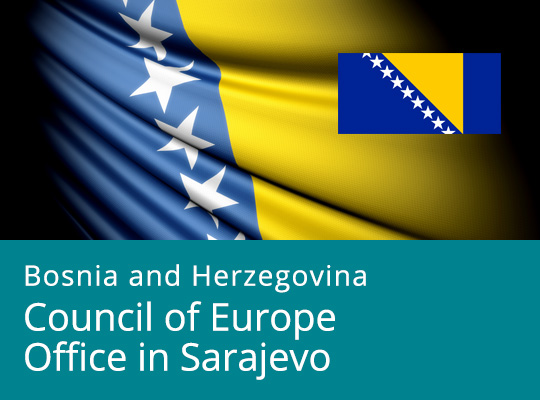Support to a coherent national implementation of the European Convention on Human Rights and facilitating execution of ECtHR judgments in Bosnia and Herzegovina
DETAILED PROJECT DESCRIPTION
|
Project title |
Support to a coherent national implementation of the European Convention on Human Rights and facilitating execution of ECtHR judgments in Bosnia and Herzegovina |
|
Country/region |
Bosnia and Herzegovina |
|
Budget |
900.000 € |
|
Donor |
Council of Europe Action Plan for Bosnia and Herzegovina 2022-2025 |
|
Duration |
24 Months (01/01/2024 – 31/12/2025) |
|
Partners and beneficiaries |
The project partners are: Bar Association of the Federation of Bosnia and Herzegovnia Bar Association of the Republika Srpska Center for Education of Judges and Prosecutors of Republika Srpska Centre for Judicial and Prosecutorial Training of the Federation of Bosnia and Herzegovina HJPC High Judicial and Prosecutorial Council of Bosnia and Herzegovina Ministries of Justice of Bosnia and Herzegovina, Federation of Bosnia and Herzegovina and Republika Srpska The beneficiaries are: Appellate Court of Brčko District of Bosnia and Herzegovina Bosnia and Herzegovina Agent's Office before the European Court of Human Rights Court of Bosnia and Herzegovina (Sud Bosne i Hercegovine) Parliament of Bosnia and Herzegovina Supreme Court of Federation of Bosnia and Herzegovina Supreme Court of Republika Srpska |
|
Main objective and objectives |
The Project aims to make the general population in Bosnia and Herzegovina benefit from quality and human rights compliant judicial system. |
|
Expected results |
The Project will contribute to the protection of human rights and strengthening domestic human rights protection mechanisms in Bosnia and Herzegovina in line with European human rights standards. In particular, the Project will focus on further strengthening national mechanisms for the national case-law harmonisation and implementation of the European Convention on Human rights (ECHR) standards, including the proper execution of the judgments of the European Court of Human Rights (ECtHR). A dialogue among relevant actors of the execution process will be facilitated in order to ensure optimal solutions for the execution of the judicial decisions of national courts, focusing on the position of the Government Agents (GAs) as de facto coordinators on the national level. In addition, the Project will contribute to improving the quality of justice through human-rights oriented adjudication facilitated with tailor-made capacity-building. Finally, the project will continue supporting Law faculties and law students in mainstreaming human rights approach and interactive technics in legal education. |
|
Key activities |
The judicial authorities in Bosnia and Herzegovina will be supported in further developing and strengthening mechanisms for harmonising judicial practice. With the aim of building on results already achieved, institutional support to the case-law departments of the Supreme Court of FBiH is further envisaged. Recognising the importance of legal advisors working at the case-law departments, the Supreme Court, while searching for a sustainable solution, managed to permanently employ only one legal advisor within the department. However, considering the number of cases and judges in the Court, further support to the department is essential for the proper functioning of the department while providing a bridge until the Court finalises its mission to ensure a sustainable solution by assuring additional funds for more legal advisors. The project team will follow up on this with relevant authorities during the project's implementation. Expert assessments/analysis of court organisational capacities and/or legal regulation for the purpose of the creation of the case-law department in the selected second-instance court. Further, seminars/round tables will facilitate dialogue among the judiciary and/or with different target groups. The objective will be to raise awareness about challenges related to specific human rights issues, distribute specific information to a broader audience on a specific topic, and contribute to the visibility of results already achieved. Placements/study visits to the Council of Europe including the ECtHR and/or to Council of Europe member states’ courts and other institutions will help legal professionals to get more in-depth knowledge related to ECHR and Council of Europe standards and/or foster understanding of different (legal) systems and promote collaboration among the peers. Studies/analysis on issues relevant to the execution of the outstanding ECtHR judgments. Raising awareness activities among relevant stakeholders and the wider public involved/influenced by the process of execution of the ECtHR judgments and tailor-made activities will be organised to strengthen their capacities in this respect with a special focus on Government Agents as de facto national coordinators of the relevant process. The initial and continuous training for judges on human rights will be further implemented as per the human rights curriculum and its manuals developed within Phase II and III. These training will be carried out by the pool of trainers established in the previous Project phase. In the context of the support to the execution process in BiH the project will consider translating/adapting/launching HELP courses relevant for the topics at stake. The JPTCs and Bar Associations of Bosnia and Herzegovina are well aware of the HELP Programme methodology and there exists a pool of HELP trainers as well as some courses already translated into one of the official languages of Bosnia and Herzegovina. As capacity building on these issues is a persistent need, there is no risk of duplication but rather optimisation of inputs delivered under other previous projects or the HELP in the Western Balkans project implemented with a regional emphasis and insufficient to cover all the training of the stakeholders at national level in all beneficiary partners. Expanding the knowledge of the ECHR standards among future legal professionals through thematic extracurricular activities for law students in Bosnia and Herzegovina and in South-East Europe.
|



